Ethiopia
Footage of an Ethiopian parliamentary session posted online on Saturday appeared to contradict official reports of the number of votes cast to validate the state of emergency, though government officials dismissed the discrepancy as a mistake.
On Friday, the House of People’s Representatives held an emergency session on state of emergency legislation imposed on Feb. 16, a day after Prime Minister Hailemariam Desalegn’s surprise resignation.
The state-run Ethiopian News Agency said on Friday that 395 lawmakers voted in favour of the bill, putting the government comfortably within the two-thirds majority needed to validate the state of emergency, which bans demonstrations and restricts publications that could incite violence.
But footage made public by the privately-owned Addis Standard news website showed parliamentary speaker Abadula Gemeda stating at the end of the session that 346 parliamentarians had voted in favour.
We apologize for the muted sound effect in the above video. Here is one with the sound effect, including one from the speaker of the house, Abadula Gemeda. pic.twitter.com/QC0FkgIkFl
— Addis Standard (@addisstandard) March 2, 2018
Abadula also appeared to have made a mathematical mistake, saying 339 was the required two-thirds of 539 seats.
In fact, a vote of 346 would be below the threshold needed if the two-thirds rule applied to the total number of seats, rather than the number of parliamentarians present.
According to Art. 93 (2) of the Ethiopian constitution, the emergency decree should be “approved by a two-thirds majority vote of members of the House of Peoples’ Representatives.”
The discrepancies sparked claims of vote fraud from the opposition.
“It is nothing less than rigging – another example of the workings of the ruling party,” Beyene Petros, an opposition party leader and former parliamentarian, told Reuters.
Speaking to state-owned Ethiopian Broadcasting Corporation late on Saturday, parliamentary speaker Abadula said 395 was the correct number of votes in favour of the legislation.
The dispute could become yet another battleground in a country where unrest was triggered over land rights, before broadening into protests over marginalization.
Sources: In unprecedented show of rejection, 88 members of parliament, mostly from Oromia, voted against #Ethiopia’s state of emergency. 7 MPs abstained. Of 441 MPs present only 346 voted YES. State media reporting the decree was approved. This is not true. It was REJECTED. pic.twitter.com/h6zap9G5AP
— Mohammed Ademo (@OPride) March 2, 2018
After years of anti-government protests, diplomats are closely watching developments in Ethiopia, a Western ally in the fight against Islamist militancy, the region’s biggest and fastest growing economy, and Africa’s second most-populous nation.
The government has struggled to placate simmering anger among the country’s two largest ethnic groups, the Oromo and Amhara, who complain that they are under-represented in the country’s corridors of power.
Media reports indicate that the ratification of the state of emergency has sparked fresh protests.
#Ethiopia – Quoting residents in #Ambo city and #Ginchi town, 125 km & 81 km west of #AddisAbeba respectively, DWAmharic reported that protests have flared up following yesterday’s news of the #StateOfEmergency. A resident of Ambo told the portal that 3 people were killed today. https://t.co/DjC670In5m
— Addis Standard (@addisstandard) March 3, 2018
The prime minister’s resignation followed two years of anti-government protests in which security forces killed hundreds of people in Oromiya province, the country’s most populous region.
The ruling EPRDF’s council is expected to announce Hailemariam’s successor next week following a vote, with many analysts expecting an Oromo to take the reins.



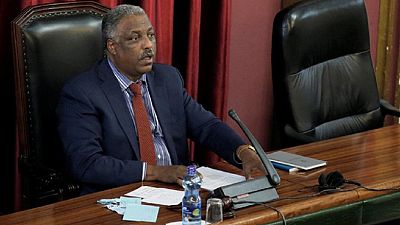

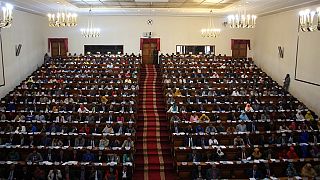
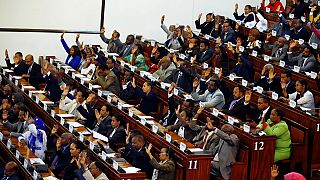
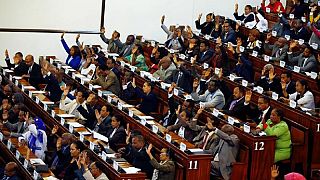
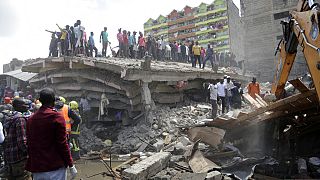


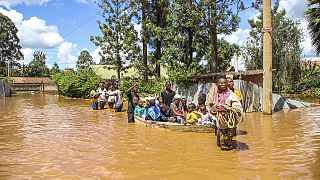

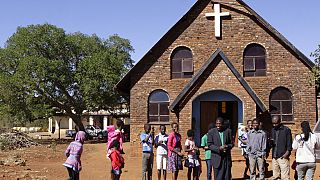
00:49
London Marathon: Women's-only world record, Kenyan double victory
00:59
Donors pledge $630 million for conflict-hit Ethiopia
01:41
UN Libya envoy Abdoulaye Bathily resigns amidst mediation challenges
01:00
Israel army chief warns Iran after retaliatory attack
Go to video
Hellen Obiri claims back-to-back Boston Marathon titles, leading Kenyan women's podium sweep
01:40
Analysis: As US watches, what's next now after Iran's first direct drone attack on Israel?